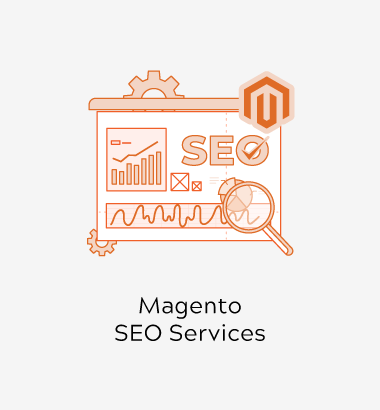Magento SEO services optimize your e-commerce store to rank higher in search engine results. They enhance visibility and drive organic traffic.
Magento, a powerful e-commerce platform, requires effective SEO strategies to maximize its potential. Proper SEO ensures your store stands out in a competitive market. By optimizing product pages, using relevant keywords, and improving site speed, your Magento store can attract more visitors.
SEO services include technical SEO, content optimization, and link building. These strategies help improve user experience and search engine rankings. Investing in Magento SEO services can lead to increased sales and brand recognition. Effective SEO practices are essential for any online store aiming to grow and succeed in the digital marketplace.
Introduction To Magento Seo Services
Welcome to our comprehensive guide on Magento SEO Services. In today’s digital landscape, having a strong online presence is crucial for any e-commerce business. This is where Magento SEO services come into play, helping you optimize your online store to rank higher in search engine results and attract more customers.
The Importance Of Seo For E-commerce
E-commerce businesses thrive on visibility and traffic. SEO is essential for driving organic traffic to your online store. Without effective SEO, your products may remain invisible to potential customers.
Here are a few key reasons why SEO is crucial for e-commerce:
- Increased visibility: Higher search engine rankings mean more people will see your store.
- Better user experience: SEO practices improve site navigation and load times.
- Cost-effective marketing: Organic traffic from SEO is free, unlike paid ads.
- Higher conversion rates: Optimized sites are more likely to convert visitors into customers.
Why Choose Magento For Your Online Store?
Magento is a popular e-commerce platform known for its flexibility and robust features. It’s an excellent choice for businesses looking to scale and customize their online stores. Here’s why:
- Customizability: Magento offers extensive customization options to meet your unique business needs.
- Scalability: Magento can handle large volumes of products and traffic, making it suitable for growing businesses.
- SEO-friendly: Magento comes with built-in SEO features that help you optimize your site effortlessly.
- Community support: A large community of developers and users provides valuable resources and support.
With Magento SEO services, you can leverage these advantages to enhance your online presence and drive more traffic to your store. Investing in SEO for your Magento store is a smart move that can yield significant returns.

Credit: www.outerboxdesign.com
Key Features Of Magento For Seo
Magento is a powerful eCommerce platform with robust SEO features. These features help your online store rank higher on search engines. Let’s dive into the key features of Magento for SEO.
Built-in Seo Tools
Magento offers a variety of built-in SEO tools. These tools make it easy to optimize your store.
- Meta Tags: Easily add meta titles and descriptions to your product pages.
- SEO-Friendly URLs: Magento allows for clean and simple URLs.
- XML Sitemaps: Generate sitemaps to help search engines crawl your site.
- Robots.txt: Control which pages search engines can index.
These built-in tools help you streamline your SEO efforts. They save time and improve visibility.
Custom Seo Solutions
Magento also supports custom SEO solutions. You can tailor your SEO strategy to fit your needs.
- Custom Meta Tags: Define unique meta tags for different pages.
- Advanced URL Rewrites: Create custom URLs for better keyword targeting.
- Rich Snippets: Add structured data to enhance search results.
- Canonical Tags: Manage duplicate content with ease.
These custom solutions allow for greater flexibility. They help you target specific keywords and improve user experience.
| Feature | Description |
|---|---|
| Meta Tags | Easily add titles and descriptions to your pages. |
| SEO-Friendly URLs | Create clean and simple URLs. |
| XML Sitemaps | Generate sitemaps for search engines. |
| Custom Meta Tags | Define unique meta tags for different pages. |
| Rich Snippets | Add structured data to search results. |
Magento’s SEO features are both powerful and flexible. They offer a comprehensive solution for optimizing your online store.
Starting With Magento Seo
Begin your Magento SEO journey by focusing on key areas that boost your website’s visibility. Start with a detailed site audit and targeted keyword research.
Site Audit: The First Step
A site audit is essential for identifying areas of improvement. Use SEO tools to analyze your site’s performance and technical setup.
| Audit Component | Description |
|---|---|
| URL Structure | Ensure URLs are clean and descriptive. |
| Meta Tags | Check for missing or duplicate meta tags. |
| Site Speed | Optimize loading time for better user experience. |
| Mobile Friendliness | Ensure your site is responsive on all devices. |
Identify broken links and fix them. Ensure your website has a clear and logical structure.
Keyword Research For Your Niche
Effective keyword research is crucial for targeting your audience. Use tools like Google Keyword Planner and SEMrush.
- Identify Primary Keywords: Choose keywords that describe your main products or services.
- Find Long-Tail Keywords: These are specific phrases with lower competition.
- Analyze Competitors: Look at the keywords your competitors rank for and aim to outperform them.
Group keywords based on intent. This helps in creating targeted content for each stage of the buyer’s journey.
Monitor keyword performance regularly. Adjust your strategy based on what works best.

Credit: meetanshi.com
On-page Seo Strategies For Magento
Mastering on-page SEO for Magento can elevate your online store’s visibility. These strategies ensure your products appear in top search results. Let’s dive into key techniques to optimize your Magento store.
Optimizing Product Pages
Every product page is crucial for SEO. Ensure your product titles are clear and contain target keywords. A well-optimized title attracts both users and search engines.
- Use descriptive and unique product titles.
- Include primary keywords naturally.
- Avoid keyword stuffing.
Next, focus on product descriptions. Write detailed and unique descriptions for each product. Highlight key features and benefits. Include your target keywords naturally within the content.
- Write engaging and informative descriptions.
- Incorporate primary and secondary keywords.
- Ensure descriptions are unique to avoid duplicate content.
Enhancing Meta Tags And Descriptions
Meta tags and descriptions play a vital role in on-page SEO. They provide search engines with essential information about your pages. Ensure each product page has an optimized meta title and description.
- Keep meta titles under 60 characters.
- Include target keywords in meta titles.
- Write unique meta descriptions for each page.
Meta descriptions should be concise and compelling. They should encourage users to click on your link. Aim to keep them under 160 characters. Use action-oriented language and include target keywords.
- Write engaging and informative meta descriptions.
- Incorporate primary keywords naturally.
- Ensure descriptions are unique and relevant.
| Element | Best Practices |
|---|---|
| Product Titles | Descriptive, unique, and keyword-rich |
| Product Descriptions | Detailed, unique, and informative |
| Meta Titles | Under 60 characters, keyword-rich |
| Meta Descriptions | Under 160 characters, action-oriented |
Technical Seo For Magento Sites
Technical SEO for Magento sites is crucial for ensuring your e-commerce platform runs smoothly and efficiently. It involves optimizing various technical aspects of your site to improve search engine rankings and user experience. Here, we delve into three key areas: Speed Optimization, Mobile Responsiveness, and Secure and Clean URLs.
Speed Optimization
Speed optimization is a critical factor for Magento sites. A slow-loading site can lead to high bounce rates and poor user experience. To enhance your site speed, consider these strategies:
- Minify CSS and JavaScript: Reducing the size of your CSS and JavaScript files can significantly speed up your site.
- Enable Caching: Utilizing caching mechanisms can help deliver content faster to returning visitors.
- Optimize Images: Compressing images without losing quality can greatly improve load times.
- Use a Content Delivery Network (CDN): A CDN can distribute your content across various servers, reducing load times for users.
Mobile Responsiveness
Mobile responsiveness is essential for a Magento site. Many users access e-commerce sites via mobile devices. A mobile-friendly site ensures a seamless shopping experience. Key practices include:
- Responsive Design: Ensure your site layout adapts to various screen sizes and orientations.
- Mobile-Friendly Navigation: Simplify navigation menus for easy use on mobile devices.
- Fast Mobile Loading Times: Optimize mobile site speed to retain users and reduce bounce rates.
- Touch-Friendly Elements: Make buttons and links large enough to be easily tapped on a mobile device.
Secure And Clean Urls
Secure and clean URLs are vital for both user trust and search engine rankings. They improve site security and make URLs more understandable. Focus on these points:
- Use HTTPS: Secure your site with an SSL certificate to protect user data and boost SEO.
- Clean URL Structure: Ensure URLs are short, descriptive, and free of unnecessary parameters.
- Avoid Duplicate Content: Implement canonical tags to prevent duplicate content issues.
- Descriptive Keywords: Include relevant keywords in your URLs to enhance SEO.
Implementing these technical SEO strategies can significantly enhance your Magento site’s performance. Prioritize speed, mobile responsiveness, and secure URLs for a robust e-commerce platform.

Credit: www.velsof.com
Content Marketing And Magento
Content marketing is a powerful tool. It helps drive traffic and improve your site’s SEO. Magento is a robust e-commerce platform. It offers excellent tools for content marketing. This combination can boost your online presence. Let’s explore how you can use Magento for content marketing.
Blog Integration
Integrating a blog with Magento is essential. A blog can help you share useful information. It can engage your audience and improve your SEO. Magento offers several ways to integrate a blog. You can use extensions or third-party services. This integration can be seamless and effective.
To integrate a blog, follow these steps:
- Choose a suitable blog extension.
- Install the extension on your Magento store.
- Configure the blog settings.
- Create and publish your first blog post.
Here’s a quick comparison of popular blog extensions for Magento:
| Extension | Features | Price |
|---|---|---|
| Blog Pro by Magefan | SEO-friendly, easy to use | Free |
| Aheadworks Blog | Advanced SEO options, mobile-friendly | $249 |
| FishPig WordPress Integration | Integrates WordPress with Magento | Free |
Using Magento For Content Distribution
Magento can be a central hub for your content distribution. You can publish blog posts, product descriptions, and customer reviews. Each piece of content can attract search engines. This helps your site rank higher.
- Publish high-quality product descriptions.
- Encourage customers to leave reviews.
- Share blog posts on social media.
These actions can drive traffic to your site. Magento’s built-in SEO tools can help you optimize your content. Use keywords, meta descriptions, and tags. This makes your content more discoverable.
Remember to update your content regularly. Fresh content keeps your site relevant. Magento makes it easy to manage and distribute content. This ensures your online store stays competitive.
Link Building For Magento Stores
Link building is crucial for improving your Magento store’s visibility. Quality backlinks can boost your site’s authority and search engine ranking. This section dives into the importance of backlinks and effective strategies for acquiring them.
The Role Of Backlinks
Backlinks are links from other websites to your Magento store. They act as endorsements, showing search engines that your site is trustworthy. The more quality backlinks you have, the better your site’s ranking.
Search engines use backlinks to gauge the relevance of your content. They see backlinks as votes of confidence. High-quality backlinks from reputable sites carry more weight. They can significantly improve your search engine position.
Strategies For Acquiring Quality Links
Getting quality links requires effort and planning. Here are some effective strategies to acquire them:
- Guest Blogging: Write valuable content for other blogs. Include a link back to your Magento store.
- Content Marketing: Create high-quality, shareable content. This can include articles, infographics, and videos.
- Social Media Sharing: Share your content on social media platforms. Encourage others to link to it.
- Collaborations: Partner with influencers or other businesses. Exchange links to each other’s sites.
- Directory Listings: Submit your store to reputable online directories. Ensure they are relevant to your niche.
Monitor your backlinks using tools like Google Analytics and Ahrefs. Ensure they are from reputable sources. Disavow any low-quality or spammy links.
Monitoring And Maintaining Seo Performance
Effective SEO is not a one-time task. It requires ongoing monitoring and regular maintenance. This ensures that your Magento store remains optimized for search engines. Continuous efforts help in adjusting strategies and improving rankings. Below are some key areas to focus on for maintaining SEO performance.
Using Analytics For Seo
Analytics tools provide valuable insights into your site’s performance. Google Analytics is a popular choice for tracking website metrics. It helps monitor traffic sources, user behavior, and conversion rates.
Here are some essential metrics to track:
- Organic Traffic: Measures the number of visitors from search engines.
- Bounce Rate: Indicates the percentage of visitors who leave after viewing one page.
- Average Session Duration: Shows the average time a user spends on your site.
- Conversion Rate: Tracks how many visitors complete a desired action.
Regularly reviewing these metrics helps identify areas for improvement. You can adjust your SEO strategies based on this data.
Regular Seo Audits
SEO audits are essential for maintaining website health. They help identify issues that could affect your search engine rankings.
During an SEO audit, consider the following:
- Check for Broken Links: Fix any broken links to improve user experience.
- Analyze Meta Tags: Ensure your meta titles and descriptions are optimized.
- Review Content Quality: Make sure your content is valuable and relevant.
- Examine Site Speed: A fast-loading site enhances user experience.
Conducting regular SEO audits helps keep your Magento store optimized. It ensures you stay ahead of competitors in search engine rankings.
Choosing The Right Magento Seo Service Provider
Finding the right Magento SEO service provider can make a huge difference. An expert will boost your online store’s visibility and increase sales. But choosing the best provider can be challenging. Knowing what to look for and asking the right questions can help.
What To Look For
- Experience with Magento: Ensure the provider has extensive experience with Magento. This ensures they understand the platform’s unique SEO needs.
- Proven Track Record: Look for case studies or testimonials. These show the provider’s past successes.
- Customized Strategies: The provider should offer tailored SEO strategies. This ensures your store gets the best possible results.
- Transparent Reporting: Regular, clear reports on SEO progress are essential. This helps you track improvements.
- Comprehensive Services: The provider should offer a range of services. These include keyword research, on-page SEO, and link building.
Questions To Ask
- What is your experience with Magento SEO? This question checks their expertise with the platform.
- Can you provide examples of past successes? Ask for case studies or references to verify their track record.
- What strategies will you use for my store? Ensure their strategies align with your business goals.
- How often will you report on progress? Regular updates are crucial for tracking success.
- What tools do you use for SEO? Their tools should be industry-standard and effective.
Choosing the right Magento SEO service provider requires careful consideration. Focus on their experience, track record, and the quality of their services. Asking the right questions will ensure you find a provider that meets your needs.
Frequently Asked Questions
What Is Magento Seo?
Magento SEO involves optimizing a Magento-based eCommerce site for search engines. It includes on-page, technical, and off-page SEO strategies.
How To Add Seo In Magento?
To add SEO in Magento, enable SEO settings, customize meta titles, descriptions, and URLs. Use SEO-friendly URLs, create sitemaps, and optimize images.
What Is The Best Magento Extension For Seo?
Mageplaza SEO Suite is the best Magento extension for SEO. It offers comprehensive features to enhance site visibility and rankings.
How Do I Find Seo Services?
Search online for reputable SEO agencies. Read reviews and testimonials. Ask for recommendations from industry peers. Check their portfolio and case studies. Compare pricing and services offered.
Conclusion
Enhancing your Magento store with SEO services boosts visibility and drives traffic. Effective strategies lead to higher search rankings. Invest in Magento SEO services to stay competitive and grow your online presence. Start optimizing now and see the difference in your sales and customer engagement.


